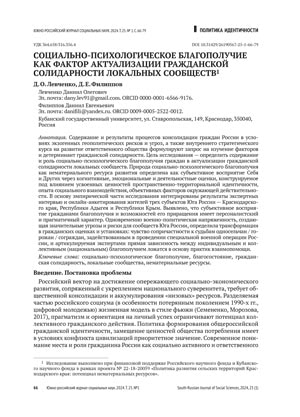Abstract
Conducting research in the area of factors of civic solidarity in Russia is determined by current processes of consolidation under conditions of exogenous geopolitical risks and threats, and common strategic course for building responsible society. The study is intended to provide a foundation for the nature and role of socio–psychological well-being of citizens in the actualization of civic solidarity of local communities. The nature of social and psychological well-being as an intangible resource for the development of local communities is defined as a subjective perception of Oneself and Others through cognitive, emotional and activity assessments, constructed under the influence of learned values of spatial and territorial identity, experience of social interaction, objective factors of the surrounding reality. The empirical part of the study is based on the results of expert interviews (N = 45) and online surveys (N = 969) of residents of three subjects of Southern Russia – Krasnodar Territory, the Republic of Adygea and the Republic of Crimea. It is revealed that citizens’ subjective perception of well-being and the possibilities of its increment has a personalistic and pragmatic character. At the same time, military-political tension, which creates significant threats and risks for communities in the South of Russia, has determined transformations in civil assessments and attitudes: a sense of belonging to the fate of fellow villagers / townspeople / fellow citizens involved in conducting a special military operation of Russia, and the direct dependence articulated by experts between individual and collective (national) well-being form the basis of mutual assistance practices.
Keywords
Funding information
The study was financially supported by the Russian Science Foundation and the Kuban Science Foundation within the framework of project No. 22-18-20059 “Policy for the development of rural areas of the Krasnodar Territory: the potential of intangible resources”.
References
Бек, У. (2000). Общество риска. На пути к другому модерну. Москва: Прогресс-Традиция.
Возьмитель, А.А. (2013). Качество жизни в доперестроечной и пореформенной России. Социологические исследования, 2, 25–32.
Воронин, Г.Л., Евграфов, К.О., Киселева, И.П., Козырева, П.М., Косолапов, М.С., Низамова, А.Э., Сивкова, И.В., Смирнов, А.И., Соколова, С.Б., Тонис, Е.И. (2023). Российские домохозяйства: динамика экономического положения (1994–2021 гг.). Вестник Российского мониторинга экономического положения и здоровья населения НИУ ВШЭ (RLMS-HSE), 13, 7–93.
Козырева, П.М., Смирнов, А.И. (2020). Реализация жизненных целей: субъективные оценки. Россия реформирующаяся, 18, 179–201.
Луман, Н. (1994). Понятие риска. THESIS, 5, 4–160.
Мирошниченко, И.В. (2023). Нематериальные ресурсы развития. В И.С. Семененко (ред.) Идентичность: личность, общество, политика. Новые контуры исследовательского поля (с. 57–67). Москва: Весь Мир.
Морозова, Е.В. (2023). Сельская идентичность. В И.С. Семененко (ред.) Идентичность: личность, общество, политика. Новые контуры исследовательского поля (с. 350–358). Москва: Весь Мир.
Рикель, А.М., Туниянц, А.А., Батырова, Н. (2017). Понятие субъективного благополучия в гедонистическом и эвдемонистическом подходах. Вестник Московского университета. Психология, 2(14), 64–82.
Русия, Н.Т., Ракачев, Д.Н. (2023). Состояние гражданской солидарности городских и сельских территорий Юга России. Журнал политических исследований, 4, 72–87. DOI: 10.12737/2587-6295-2023-7-4-72-87
Семененко, И.С., Морозова, Е.В. (2017). Идентичность в меняющемся мире: ориентиры, смыслы, траектории динамики. В Идентичность: личность, общество, политика (с. 77–88). Москва: Весь Мир.
Татарова, Г.Г., Кученкова, А.В. (2016). Показатели субъективного благополучия как типообразующие признаки. Социологические исследования, 10, 21–32.
Татарова, Г.Г., Кученкова, А.В. (2020). «Удовлетворенность жизнью» и «личное счастье» в социологическом измерении субъективного благополучия. Россия реформирующаяся, 18, 565–589.
Тишков, В.А. (2013). Российский народ: история и смысл национального самосознания. Москва: Наука.
Федеральная служба государственной статистики. Режим доступа https://rosstat.gov.ru/
Черныш, М.Ф., Епихина, Ю.Б. (ред.). (2021). Социологические подходы к изучению социального благополучия. Москва: ФНИСЦ РАН.
Шилова, В.А. (2020). Субъективное благополучие в понимании россиян: оценки уровня, связь с другими показателями, субъективные характеристики и модели. Информационно-аналитический бюллетень. Субъективное и объективное благополучие в современном российском обществе: результаты эмпирического исследования, 1, 18–38.
Bradburn, N. (1969). The Structure of Psychological Well-being. Chicago: Aldine Publishing Company.
Diener, E. (1984). Subjective Well-Being. Psychological Bulletin, 3(95), 542–575.
Edmans, A. (2010). The Link between Job Satisfaction and Firm Value, with Implications for Corporate Social Responsibility. Academy of Management Perspectives, 4(26), 1–19.
Kessler, J.B., McClellan, A., Nesbit, J., Schotter, A. (2022). Short-Term Fluctuations in Incidental Happiness and Economic Decision-Making: Experimental Evidence from a Sports Bar. Experimental Economics, 1(25), 141–169.
Keyes, C. (1998). Social Well-Being. Social Psychology Quarterly, 61, 121–140.
Layard, R., De Neve, J.-E. (2023). Wellbeing: Science and Policy. Cambridge: Cambridge University Press.
Parsons, T. (1954). Values, Motives and Systems of Action. In Parsons T., Shils E. (Eds.) Toward a General Theory of Action (pp. 506). Cambridge: Harvard University Press Publ.
Zalewska, A.M. (2023). Citizenship Activity in Emerging Adults: the Role of Self-Esteem, Social Skills, and Well-Being. Current Issues in Personality Psychology, 2(11). DOI: 10.5114/cipp/156763


